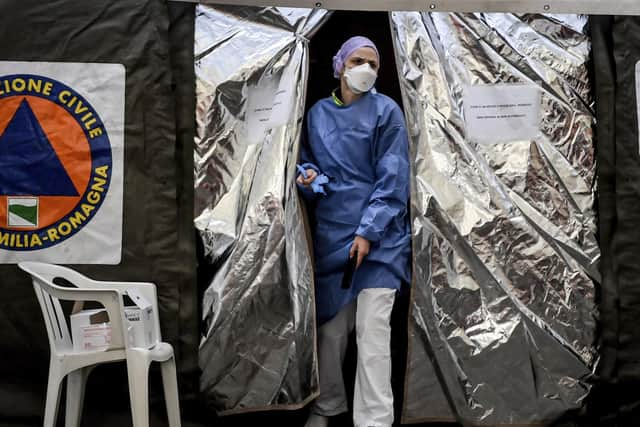'Highly likely' Scottish coronavirus case is already here
Dr Kate Broderick, who is originally from Dunfermline, has been working round the clock with her team of researchers at the pharmaceutical giant Inovio in San Diego, California, to develop a life-saving jab in six months.
She told The Scotsman that she thought it was inevitable there would be an outbreak in Scotland of the virus – known as Covid-19 – and confirmed that vaccine testing had been completed on animals including rabbits, guinea pigs and primates.
Advertisement
Hide AdAdvertisement
Hide AdDr Broderick said the situation has “gotten a whole lot worse” but confirmed the manufacturing of the vaccine to be used on humans was on course for early summer.


She warned Scots to think about the consequences of going on holiday with the possibility of potential quarantine on their return.
She said: “A lot of my family have been emailing me asking if they should go on their holidays.
“If you’re a healthy adult or child, even if you get Covid-19 you’re probably going to be OK.
“My thing is more, ‘Are you prepared to go into quarantine for 14 days when you get back from your holidays if somebody asks you to do that?’
“So I think it’s not really just about having the virus or not – it’s the implications for your job and your general life if you have to stay in your home for 14 days.
“You could go on holiday then be told that anyone who’s been to Spain now has to stay 14 days in self-isolation.” Dr Broderick, 42, who studied at Glasgow University before doing post-doctoral research at the University of California, said reports of reinfection were “particularly worrying” but was quick to stress they had not been confirmed.
She said: “I read about a lady in Japan who had tested positive, recovered, then tested positive again, then got sick again.
Advertisement
Hide AdAdvertisement
Hide Ad“I don’t know at the moment whether those are confirmed clinically or not, but if that is the case it’s really concerning.
“It means that potentially in those people the immune response they mounted naturally to the infection wasn’t enough to stop them being infected again. Usually when you get measles or chickenpox you can’t get it again because you’ve mounted a defence, but there are indications with Covid-19 that there appear to be some people who are getting it again.
“So there are other illnesses where the virus can go dormant in your body – like if you’ve ever had a cold sore.
“Once you get one cold sore you can always get another because the herpes virus basically hides, and when you’re feeling stressed or unwell or you get exposure to UV sunlight it can reactivate itself and give you another cold sore.
“The implications for that are extremely worrying.”
Dr Broderick said the mortality rate at one or two per cent in China was “really quite high – but it’s not Ebola-high” and repeated that it’s still higher than the flu and “people really need to understand that”.
On the issue of labelling Covid-19 a pandemic, she said: “At the moment the World Health Organisation, who need to make that designation, are saying they want to hold off on [calling it] that but in my humble opinion I would say we must be getting extremely close to that point now.”
However, Dr Broderick provided reassurance to parents concerned for the welfare of their children.
She added: “Kids can get infected but it does seem that in children those cases are very mild, so it’s possible even if you had an infected child they might just look like they had a cold.
Advertisement
Hide AdAdvertisement
Hide Ad“It might not be too serious with them at all – which is of course wonderful – that means they won’t succumb to the virus. But it also means they might have it and you might not necessarily be quarantining them or putting them in isolation.
Meanwhile a case of coronavirus has been diagnosed in Northern Ireland, the Public Health Agency has said.
Chief Medical Officer Dr Michael McBride said the patient had come from northern Italy via Dublin. He said the patient had contacted a GP and had taken steps to self-isolate.
Dr McBride said the case had showed a presumptive positive result and it would be confirmed by a lab in England.
The BBC said any confirmed case was to be taken to an isolation unit in Belfast’s Royal Victoria Hospital.
The total number of Covid-19 cases in the UK has now risen to 16 after three people were diagnosed in total yesterday.
The virus has killed 2,747 people in China where it originated, according to the World Health Organisation. Globally, more than 80,000 people in more than 40 countries have been infected with Covid-19.